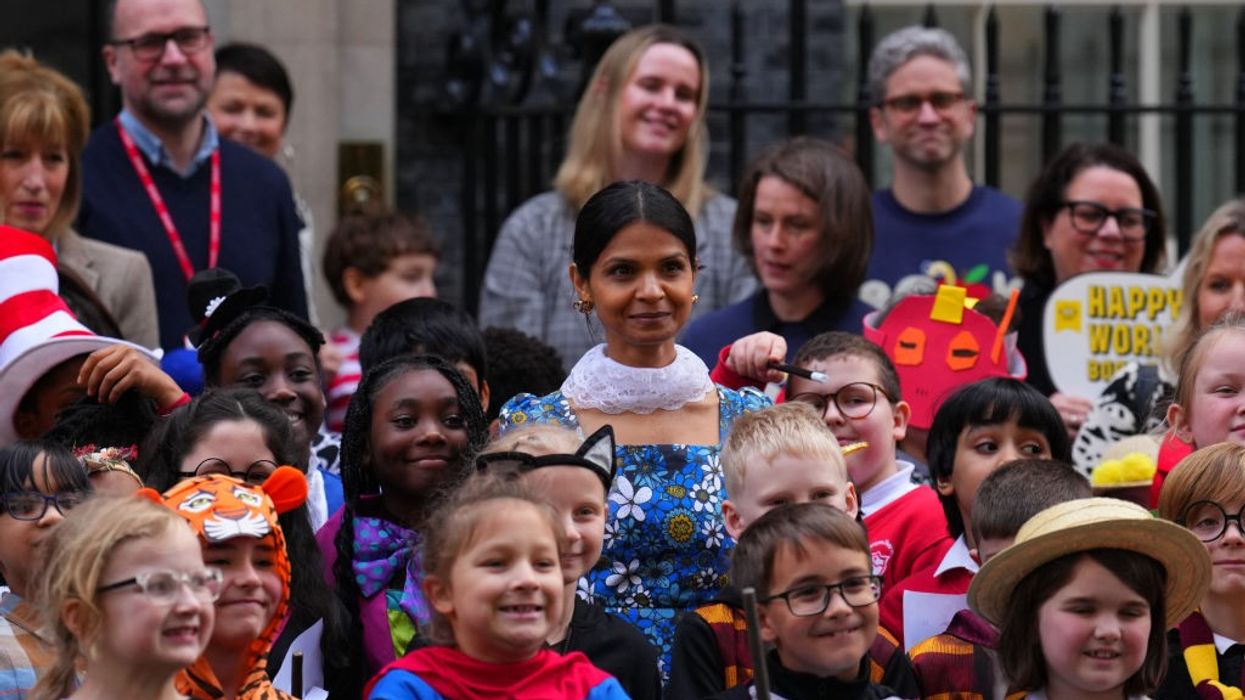While prime minister Rishi Sunak may be going through a politically turbulent period with the Conservative party facing a defeat in the recent local election and opinion polls favouring Labour in the forthcoming general elections, his wife Akshata Murty appears unperturbed and focused on the smooth running of the house.
For a year, she has been inviting schoolchildren into Downing Street for Lessons every Friday, The Times reports. The 44-year-old 'Mrs M', as the Downing Street staff call her, likes to walk the dog and take the Tube.
She claims few people recognise her and she loves the anonymity. She takes her dog Nova, a labrador, for a walk in St James’s Park most weeks.
The prime minister calls her his secret weapon. A former aide told the daily that Sunak relies on her easygoing nature to relax. After going through all the political intrigues of the day, Sunak finds Akshata's calm demeanour back home soothing.
However, he did jokingly remark during a joint video interview for a magazine for International Women’s Day that she is messy and doesn’t like making the bed. Akshata had later said he was a "stickler for the rules" whereas she is "much more free-spirited".
Akshata is the daughter of NR Narayana Murthy, one of India’s richest men and co-founder of the Infosys tech company, now valued at £56-£64 billion. Murty is already worth some £500 million and last month was handed another £10.5 million Infosys dividend.
She managed to keep out of the public eye until her non-dom status became public while her husband was chancellor. This gave Sunak's rivals enough fodder to snipe at him and accuse Akshata of avoiding tax while the country was facing recession.
She later issued a long Twitter/X thread where she said she didn’t want her tax status to be “a distraction for my husband” and would change the arrangement.
Akshata often sidesteps any political questions - be it the Rwanda policy or immigration. “I’m not the elected politician; I’m the wife,” she told the daily.
The role of the prime minister’s spouse is a tough one with round a clock media spotlight.
Carrie Johnson, a recent occupant of the role, was cast as a manipulative person leading Boris Johnson astray. Samantha Cameron remarked that it is very harsh and "trying to do your best in a role you may not be expecting".
Akshata has been berated for wearing £600 Gucci trainers one day and then for being spotted in £30 faux-fur slides.
After Sunak became the prime minister, Akshata began meeting children during reception and while touring the country. They had many questions about Downing Street.
She then decided that the prime minister's residence should not be a 'gilded cage' and began inviting schoolchildren. She tested the idea with a few schools and soon made it a weekly feature.
Having been a fashion designer, creating her own brand, and also a venture capitalist, defining her role in Downing Street wasn’t straightforward. “Every spouse has done it differently. My view is, in what small way can I add value, not just by supporting Rishi, but what I can do that’s worthwhile while living here? Education is one area that has always been meaningful to me,” she told the daily.
While growing up in Bengaluru, Akshata went to Baldwin Girls’ High School in a rickshaw. She says that, together with her younger brother, Rohan, she was expected “to do chores around the house”.
She was born the year before her father founded Infosys and she used to live with her grandparents while her mother and father worked in Mumbai. Within a few years, her parents had made enough to move the family to Bengaluru.
Akshata’s family first came to London on a visit when she was about 12 and remembers seeing Downing Street, but never expected to be a resident at this famous address.
She calls her mother Sudha, who runs the Infosys charitable foundation, her role model. Sudha was one of the first female electrical engineers in India – the only female engineering student at her college out of 599 boys.
When she saw a job advertisement for engineers on the Tata automotive production line that excluded woman applicants, she wrote a postcard to the chairman JRD Tata, who hired her. It was there she met Narayana.
Akshata feels the same about her daughters, Krishna, 13, and Anoushka, 11. “To be honest, Rishi is so busy these days he doesn’t have the same input, but I don’t worry about my girls. I always say it’s about the journey before a music or drama exam and give them a little book or something before they get the result. I want them to find a passion,” she told the daily.
For someone so rich and now well connected, endlessly shaking the hands of world leaders, she is surprisingly self-effacing, happy to embrace the role of loyal spouse.
She claims she tries hard to keep life as routine as possible. "I am not a politician. I can’t always please everyone. My father told me the softest pillow is a clear conscience. Do your best and then you don’t worry. So that’s my role. To keep the show going,” she told the daily.
Before her husband became an MP, Akshata used to keep track of news, but now she avoids as it has become much more personal.




